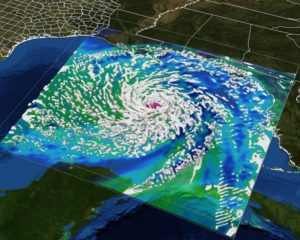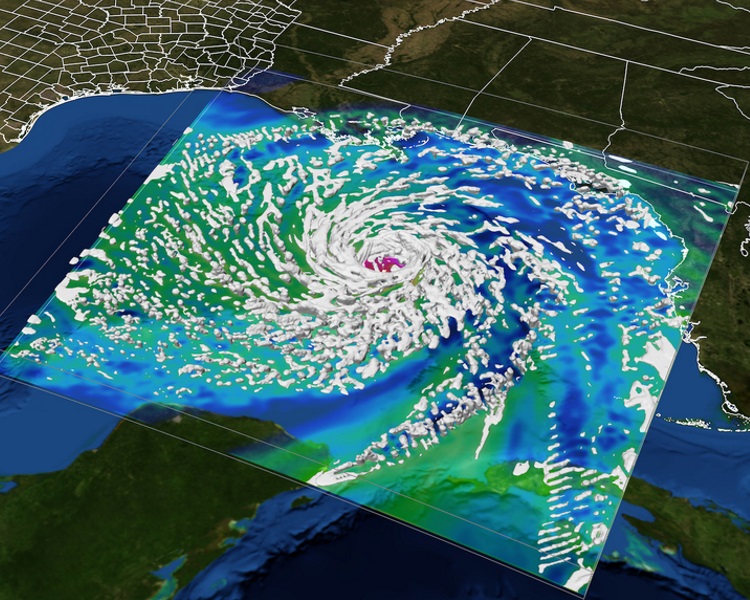
A computer visualization of Hurricane Ike shows the storm developing in the Gulf of Mexico before making landfall at the Texas coast. In times of emergency, the Texas Advanced Computing Center serves as a hub for hazard forecasting, response and recovery.
The Royal Society Publishing has recently released a special compendium of articles based on a recent scientific discussion meeting with HPC Industry thought leaders. Entitled “Numerical algorithms for high-performance computational science,” the publication was organized and edited by Jack Dongarra, Laura Grigori and Nicholas J Higham.
The evolving architectures of high-performance computers make it challenging to exploit these machines fully for computational science, which has increasingly high resolution and data intensive problems. This issue contains contributions from those who develop and implement numerical algorithms and software libraries – numerical analysts, computer scientists, and high-performance computing researchers – with those who use them in some of today’s most challenging applications. The applications represented include deep learning, the human brain project, climate modelling and the Square Kilometre Array. Ideas are discussed that will contribute to a new generation of algorithms that can solve such problems quickly, accurately, and with minimal energy consumption.
Contents:
- The future of computing beyond Moore’s Law, John Shalf
- Hierarchical algorithms on hierarchical architectures, D. E. Keyes, H. Ltaief and G. Turkiyyah
- Stochastic rounding and reduced-precision fixed-point arithmetic for solving neural ordinary differential equations, Michael Hopkins, Mantas Mikaitis, Dave R. Lester and Steve Furber
- Preparing sparse solvers for exascale computing, Hartwig Anzt, Erik Boman, Rob Falgout, Pieter Ghysels, Michael Heroux, Xiaoye Li, Lois Curfman McInnes, Richard Tran Mills, Sivasankaran Rajamanickam, Karl Rupp, Barry Smith, Ichitaro Yamazaki and Ulrike Meier Yang
- On the cost of iterative computations, Erin Carson and Zdeněk Strakoš
- Rethinking arithmetic for deep neural networks, G. A. Constantinides
- Machine learning and big scientific data, Tony Hey, Keith Butler, Sam Jackson and Jeyarajan Thiyagalingam
- The physics of numerical analysis: a climate modelling case study, T. N. Palmer
- Exascale applications: skin in the game, Francis Alexander, Ann Almgren, John Bell, Amitava Bhattacharjee, Jacqueline Chen, Phil Colella, David Daniel, Jack DeSlippe, Lori Diachin, Erik Draeger, Anshu Dubey, Thom Dunning, Thomas Evans, Ian Foster, Marianne Francois, Tim Germann, Mark Gordon, Salman Habib, Mahantesh Halappanavar, Steven Hamilton, William Hart, Zhenyu (Henry) Huang, Aimee Hungerford, Daniel Kasen, Paul R. C. Kent, Tzanio Kolev, Douglas B. Kothe, Andreas Kronfeld, Ye Luo, Paul Mackenzie, David McCallen, Bronson Messer, Sue Mniszewski, Chris Oehmen, Amedeo Perazzo, Danny Perez, David Richards, William J. Rider, Rob Rieben, Kenneth Roche, Andrew Siegel, Michael Sprague, Carl Steefel, Rick Stevens, Madhava Syamlal, Mark Taylor, John Turner, Jean-Luc Vay, Artur F. Voter, Theresa L. Windus and Katherine Yelick
- Big telescope, big data: towards exascale with the Square Kilometre Array, A. M. M. Scaife
- Optimal memory-aware backpropagation of deep join networks, Olivier Beaumont, Julien Herrmann, Guillaume Pallez (Aupy) and Alena Shilova
- High-performance sampling of generic determinantal point processes, Jack Poulson
- A survey of algorithms for transforming molecular dynamics data into metadata for in situ analytics based on machine learning methods, Michela Taufer, Trilce Estrada and Travis Johnston
- The parallelism motifs of genomic data analysis, Katherine Yelick, Aydın Buluç, Muaaz Awan, Ariful Azad, Benjamin Brock, Rob Egan, Saliya Ekanayake, Marquita Ellis, Evangelos Georganas, Giulia Guidi, Steven Hofmeyr, Oguz Selvitopi, Cristina Teodoropol and Leonid Oliker
Recordings and other materials from the meeting are also available online.




